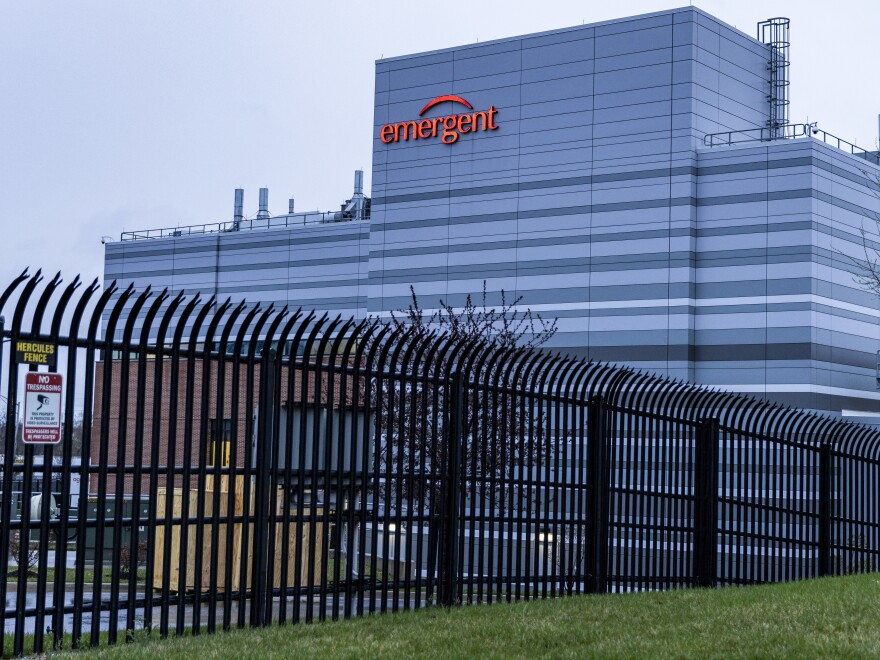Updated April 1, 2021 at 2:53 PM ET
Johnson & Johnson is reporting a setback in its effort to produce tens of millions of COVID-19 vaccine doses, saying a contract production plant in Baltimore produced an ingredient that failed quality control tests. The material was made by Emergent BioSolutions, according to Johnson & Johnson.
Johnson & Johnson said the issue "was identified and addressed with Emergent," adding that it also informed the U.S. Food and Drug Administration.
The drug company said the problem involved one batch of a substance that goes into its coronavirus vaccine. It said the apparent mix-up happened at an Emergent site that is part of its manufacturing network but does not yet have FDA authorization to produce part of the COVID-19 vaccine.
Emergent is not currently part of the coronavirus vaccine supply chain but was ramping up to be. This batch was part of the approval process, and would have been used if successful.
In a news release, Johnson & Johnson said quality control checks had flagged the problem before the problematic batch affected more doses.
"It's important to note that these wouldn't be finished doses, just key ingredients ultimately bound for another facility to be put into vials and prepared for distribution," NPR's Sydney Lupkin reported.
The snag was first reported by The New York Times, which said 15 million vaccine doses were potentially affected. Neither Johnson & Johnson nor Emergent have confirmed that figure.
The Times and The Washington Post reported that the issue was a mix-up between the coronavirus vaccine material that Emergent is producing for Johnson & Johnson and AstraZeneca.
"The two vaccines use the same technology employing a harmless version of a virus — known as a vector — that is transmitted into cells to make a protein that then stimulates the immune system to produce antibodies. But Johnson and Johnson's and AstraZeneca's vectors are biologically different and not interchangeable," The Timesreported. "In late February, one or more workers somehow confused the two during the production process, raising questions about training and supervision."
Emergent said that quality control systems "worked as designed" to detect the issue and isolate the batch.
"[T]here are rigorous quality checks throughout our vaccine manufacturing processes, and through these checks a single batch of drug substance was identified that did not meet specifications and our rigorous quality standards. We isolated this batch and it will be disposed of properly," Matt Hartwig, a spokesperson for Emergent, said in a statement to NPR.
"Discarding a batch of bulk drug substance, while disappointing, does occasionally happen during vaccine manufacturing, which is a complex and multi-step biological process," he added. "We continue to manufacture in support of our customers and the U.S. government, and we remain confident in our ability to meet the FDA requirements."
White House press secretary Jen Psaki said Thursday that the Department of Health and Human Services notified the White House late last week about the production mistakes at the Emergent plant in Baltimore.
When asked why the administration didn't disclose it earlier, Psaki cited the fact that the plant is not yet authorized by the FDA for distribution of the vaccine.
In a statement sent to NPR, an FDA spokesperson confirmed that the agency is aware of the situation but said it cannot comment further, citing the confidentiality that surrounds relationships between drugmakers and their contract manufacturers.
Nearly 6.8 million doses of the COVID-19 vaccine developed by Janssen, a Johnson & Johnson subsidiary, have been delivered to the U.S. so far, according to figures from the Centers for Disease Control and Prevention. But the company said another large tranche of vaccine is on the way. As it announced the problem in Baltimore, Johnson & Johnson also said it will meet its goal of supplying more than 20 million vaccine doses in the U.S. by the end of March.
The numbers are being watched closely as millions of people in the U.S. and elsewhere await their turn to get a COVID-19 vaccine. Johnson & Johnson said it's still planning to deliver 100 million doses of its single-shot vaccines to the U.S. by the end of May.
The site where the mix-up happened is Emergent's Bayview facility, according to Johnson & Johnson. The Baltimore campus is where Emergent anchors a Center for Innovation in Advanced Development and Manufacturing – one of three such government-backed facilities in the U.S. that are coordinated by HHS.
Emergent BioSolutions got its start in 1998 as the BioPort Corp. – a company that was the subject of criticism and scrutiny almost from its inception due to problems with how it handled exclusive contracts with the U.S. military to produce anthrax vaccine. Fallout from those issues resulted in a congressional inquiry.
The company later changed its name, but problems have persisted. As The Associated Press reported, an FDA inspector criticized the Bayview plant in Baltimore early last year, even as Emergent was reaching its deal with Johnson & Johnson. The government inspector cited a lack of training to ensure a successful manufacturing process.
According to Emergent's financial records, the company's biggest sellers last year were vaccines for anthrax and smallpox – two categories that each generated more than $300 million in revenue.
The COVID-19 pandemic brought a windfall to the company, with it reporting that contract development and manufacturing operations such as the one with Johnson & Johnson had spiked from $80 million in 2019 to $450.5 million in 2020 — an increase of $370.5 million.
NPR science correspondent Richard Harris contributed to this report.
Copyright 2021 NPR. To see more, visit https://www.npr.org. 9(MDA5NTM4MTIyMDE0MTg3NDc2MTVlZjdmNQ001))







